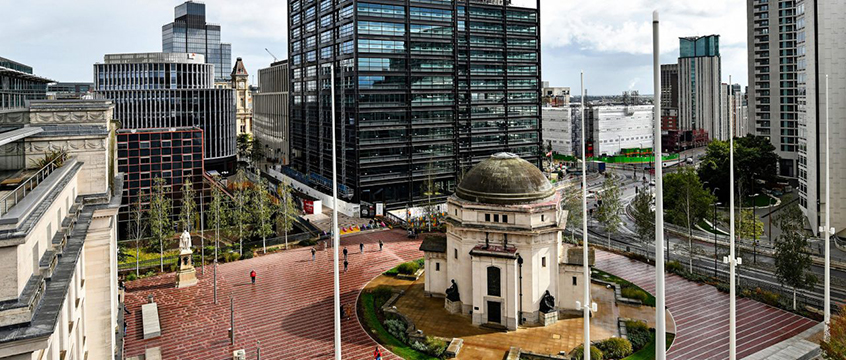West Midlands submits plans for six investment zones
The West Midlands has submitted formal plans for a series of investment zones, along with the development of more than 30m sq ft of commercial space and 18,000 homes.
The formal submission, if accepted by ministers, would create six investment zones centred around the Coventry gigafactory, east Birmingham and north Solihull, Dudley, Sandwell, Walsall, and Wolverhampton.
The West Midlands Combined Authority said that zones had the potential to boost the regional economy by more than £4.7bn a year, creating more than 30m sq ft of commercial space and 18,616 homes.
The West Midlands has submitted formal plans for a series of investment zones, along with the development of more than 30m sq ft of commercial space and 18,000 homes.
The formal submission, if accepted by ministers, would create six investment zones centred around the Coventry gigafactory, east Birmingham and north Solihull, Dudley, Sandwell, Walsall, and Wolverhampton.
The West Midlands Combined Authority said that zones had the potential to boost the regional economy by more than £4.7bn a year, creating more than 30m sq ft of commercial space and 18,616 homes.
The zones, a central plank of the prime minister’s growth plan, offer tax breaks, relaxed planning rules and other incentives to make it easier, quicker and cheaper for the private sector to do business, helping to attract significant inward investment.
But the submission has stressed that the economic growth offered by the zones should not be at the expense of the region’s overarching mission to build a “fairer, greener and better-connected West Midlands” or its ambition to reach net-zero within the next two decades.
Mayor of the West Midlands and chair of the WMCA Andy Street said: “Investment zones have the potential to supercharge economic growth in our region and so I’m really pleased that, in close collaboration with our local authority partners, we’ve been able to submit such a strong array of options to government.”
The proposed investment zones are:
West Midlands Gigafactory Investment Zone: Large sites at Coventry Airport and in its surroundings in Warwick District, with the primary objective of securing major inward investment in a battery gigafactory, and the associated battery and automotive supply chain, focused entirely on employment land.
East Birmingham North Solihull Investment Zone: Large strategic sites at Arden Cross in Solihull (around the HS2 Interchange station), sites in East Birmingham, and smaller sites in Solihull Town Centre, all focused on attracting private investment to deliver jobs, alongside housing and town centre regeneration.
Dudley Investment Zone: A package of brownfield sites around the route of the Metro extension from Wednesbury to Brierley Hill (many within a 15 minute walk from the Metro Extension), including schemes in Dudley town centre, Brierley Hill and Lye, creating both housing and employment sites.
Sandwell Investment Zone: A collection of brownfield sites around the route of the Wednesbury to Brierley Hill Metro extension, including schemes at Wednesbury and Tipton, creating housing and industrial space, and regenerating existing industrial premises.
Walsall Investment Zone: A brownfield site programme including large employment sites near the M6 and smaller sites in the town centre and across the wider borough, focused on land assembly, viability and remediation to bring sites forward, with a mixture of commercial, residential and mixed-use development.
Wolverhampton Investment Zone: Featuring the high-growth high-skilled Green Innovation Corridor to the north of the city, and a number of housing and employment sites in the city centre, focused on reinforcing Wolverhampton’s world-class green manufacturing and sustainable construction sectors.
Street added: “Having been involved in establishing one of the UK’s most successful enterprise zones in and around Centenary Square in Birmingham, I have seen first-hand the power these special economic areas can have with the ability to bring about genuinely transformational change and investment.
“Most importantly we know that Investment Zones can accelerate the delivery of tangible outcomes for local residents – including boosting employment prospects.”
Councillor Mike Bird, WMCA portfolio lead for housing and land, and leader of Walsall Council, said: “Our submission puts a huge focus on attracting substantial private sector investment by creating the conditions that will give business the long-term certainty and stability needed to invest.”
Many of the locations put forward in the West Midlands submission build on the opportunities offered by the HS2 high speed rail line.
They also reflect the signalling by government of its intention to fast track several transport schemes, including the Wednesbury to Brierley Hill Metro tram extension, enhanced transport solutions for the East Birmingham to North Solihull corridor, the new Aldridge railway station, and links to the new train stations at Willenhall and Darlaston.
The Birmingham city centre enterprise zone was set up in 2014 and has led to the redevelopment of the city’s Paradise Circus area, now rebranded Paradise Birmingham (pictured).
Rob Groves, regional development director of MEPC, development and asset managers of the Paradise Birmingham scheme, said that enterprise zone status was “hugely significant”.
“It unlocked the scheme by providing the much-needed investment to make the major infrastructure changes required,” he said. “Paradise is a real illustration of the success that can be achieved with the type of public/private partnerships set out in these new investment zones and the wider benefits they can bring.”
To send feedback, e-mail piers.wehner@eg.co.uk or tweet @PiersWehner or @EGPropertyNews
Photo © Paradise Circus General Partner Limited











